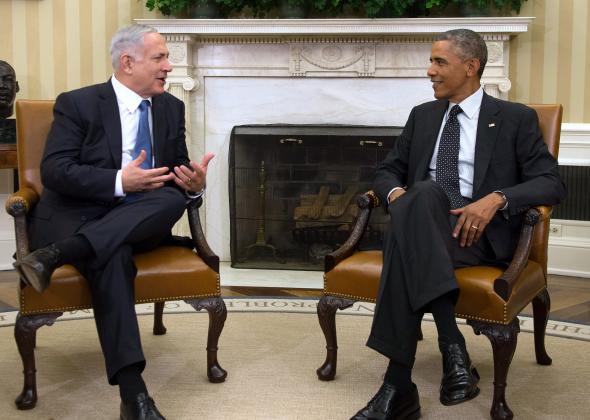The big diplomatic story of the day is an anonymous Obama administration official’s claim, in an Atlantic feature by Jeffrey Goldberg, that Benjamin Netanyahu is a “chickenshit.” Why is the Israeli prime minister a chickenshit? Because “he won’t do anything to reach an accommodation with the Palestinians or with the Sunni Arab states. The only thing he’s interested in is protecting himself from political defeat. He’s not [Yitzhak] Rabin, he’s not [Ariel] Sharon, he’s certainly no [Menachem] Begin. He’s got no guts.” In the same story, another official concurs that Netanyahu is a “chickenshit” and adds that he’s a “coward” with regards to launching a possible preemptive strike to forestall Iran’s nuclear capabilities.
Let’s put aside for a moment the inherent irony of using an anonymous quote to call someone a coward while the Obama administration publicly issues paeans to the frank and productive partnership between Israel and U.S. Instead, I’ll note that this is the second notable anonymous scatological description of the Israeli government by an anonymous American to hit the Internet this week. Discussing the Obama administration’s snub of Israeli Defense Minister Moshe Yaalon—he was denied meetings with both Vice President Joe Biden and National Security Advisor Susan Rice during a recent trip to Washington—a “pro-Israel congressional aide” told Foreign Policy’s John Hudson, “There is a limit to how much you can shit all over the White House and expect to get every meeting you want.”
Yaalon had previously described Secretary of State John Kerry as “obsessive and messianic.” That was fairly mild compared to the anonymous Israeli officials who described one of Kerry’s peace proposals during last summer’s Gaza War as a “strategic terrorist attack” against Israel.
So, everyone seems to be in basic agreement on just how shitty relations have become between the U.S. and Israeli governments. Following Yaalon’s snub, Israel’s Finance Minister Yair Lapid fretted, “There is a crisis with the U.S. and we should treat it as a crisis.”
The question is, what are the actual implications of this crisis? The two sides may be trading insults because, politically, it’s about all they can do. Despite all the sniping, there hasn’t been much material change in the U.S.-Israel relationship. The Obama administration has continued the longstanding U.S. practice of running interference for Israel at the UN, threatening to veto repeated Palestinian statehood bids and, more recently, casting the sole vote against launching an inquiry into potential human rights violations during the Israeli incursion into Gaza.* Unlike Great Britain and Spain, the United States—Israel’s primary military backer—announced no plans to review or suspend arms shipments to the country as a result of the war in Gaza. I wouldn’t expect this behavior to change significantly, whatever senior U.S. officials are saying behind closed doors and with the veil of anonymity.
It doesn’t matter that much to Netanyahu if American officials insult him in the media or won’t meet with his cabinet ministers as long as Israel still derives most of the benefits of its security partnership with the U.S. The tension with the Obama administration may even help the prime minister with his right-wing base, who were never huge fans of the president to begin with.
Naftali Bennett, the economics minister of the far-right Jewish Home party, is already playing up the victimhood, writing on Facebook, “If what was written [in The Atlantic] is true, then it appears the current administration plans to throw Israel under the bus. The prime minister is not a private person but the leader of the Jewish state and the whole Jewish world.” (The latter part of that statement was news to me, and I’m assuming many other members of “the whole Jewish world.”)
Netanyahu seems, for the most part, to have written off the White House, preferring to deal instead with Congress, where his support is stronger. Unfortunately for him, Congress is increasingly not where U.S. foreign policy is made on issues ranging from the negotiations over Iran’s nuclear program to the fight against ISIS. He may figure he can just run out the clock on the Obama administration until a Republican or a more amenable Democrat like Hillary Clinton gets into office.
This is a risky long-term strategy. U.S. support for Israel may be mostly secure in the short term, but there are signs of change. U.S. media coverage of the most recent war in Gaza was notably more critical than during similar incidents in the past. Young Americans are more critical of Israel than their parents, and tomorrow’s Republican leaders may not be quite as ironclad in their support of the Jewish state as today’s are. In the years to come, then, anonymous sniping could feel quaint—a reminder of when the two countries cared enough about their relationship not to insult each other openly.
*Correction, Oct. 31, 2014: This post originally originally stated that the Obama administration had vetoed a Palestinian statehood bid at the United Nations. The 2011 statehood bid actually stalled after the U.S. declared its intention to veto.
